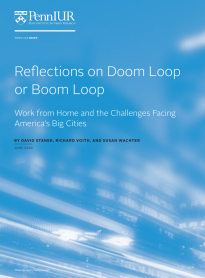Key Message
The COVID-19 pandemic significantly increased working from home (WFH) in major U.S. cities like New York, reshaping economic landscapes by reducing in-person activities in sectors such as real estate, housing, labor, and transportation. This shift has raised concerns about a potential "Doom Loop," where declining urban productivity leads to fiscal stress, vacant offices, and reduced economic competitiveness. However, cities can also seize the opportunity for a "Boom Loop" by leveraging technological advancements, optimizing remote work for tasks not requiring physical presence, and modernizing infrastructure to accommodate flexibility. Policy recommendations for cities, particularly New York, include promoting innovation sectors, adjusting tax systems to encourage in-person work, reforming zoning regulations to lower housing costs, and enhancing amenities to attract residents. These measures can help cities navigate the challenges of WFH and capitalize on its potential for economic growth.

